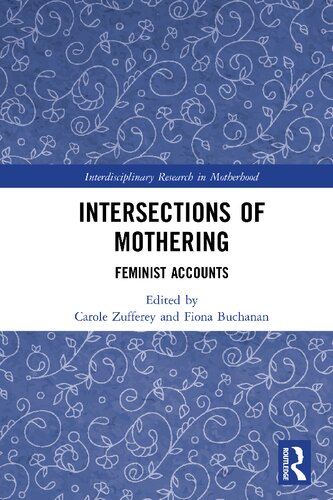

Most ebook files are in PDF format, so you can easily read them using various software such as Foxit Reader or directly on the Google Chrome browser.
Some ebook files are released by publishers in other formats such as .awz, .mobi, .epub, .fb2, etc. You may need to install specific software to read these formats on mobile/PC, such as Calibre.
Please read the tutorial at this link: https://ebookbell.com/faq
We offer FREE conversion to the popular formats you request; however, this may take some time. Therefore, right after payment, please email us, and we will try to provide the service as quickly as possible.
For some exceptional file formats or broken links (if any), please refrain from opening any disputes. Instead, email us first, and we will try to assist within a maximum of 6 hours.
EbookBell Team

4.0
16 reviewsThis book presents new interdisciplinary and intersectional research about women as mothers, highlighting that alternative accounts of mothering can challenge normative societal assumptions and broaden understandings of women as mothers, mothering and motherhoods.
Mothering occurs within unequal power relations associated with the disadvantages and privileges of an unjust and patriarchal society. Social inequalities associated with gender, race, class, age, ability, sexuality, violence and nationalism intersect in the lives of women as mothers, to shape their lived experiences and perspectives on mothering. Showcasing the breadth and depth of feminist research on mothering, this book gives attention to the diversity of ways in which mothering is constructed and responded to as well as how mothering is experienced. Drawing on intersectional feminist thought, the book challenges normative visions of ‘good mothering’ and interrogates constructs of ‘bad mothering’. It brings together insights from multidisciplinary scholars who use feminist approaches in their research on mothering, to inform policy development and practice when working with women as mothers in diverse circumstances. Intersections of Mothering highlights the complexities of mothering in a contemporary world, show the benefits of considering mothering through an intersectional feminist lens, make visible lived experiences of mothers and provides challenges to dominant imaginings of and service responses to women as mothers.
Intersections of Mothering will be essential reading for interdisciplinary scholars and students in criminology, gender and women’s studies, motherhood studies, social welfare, social work, social policy and public health policy, in addition to practitioners and policy workers that respond to women as mothers.